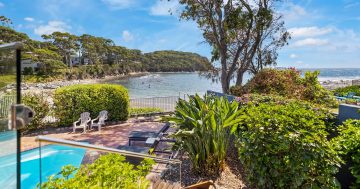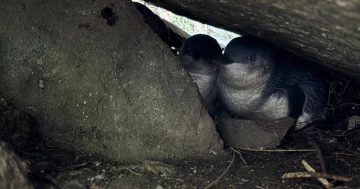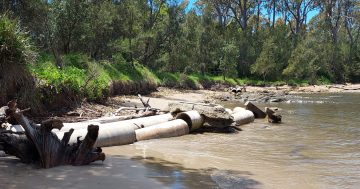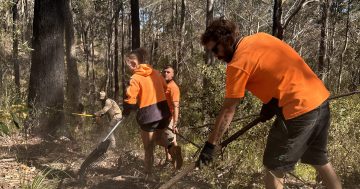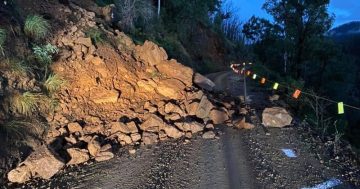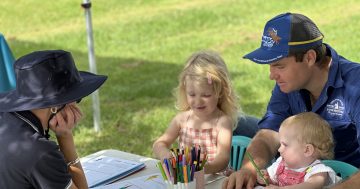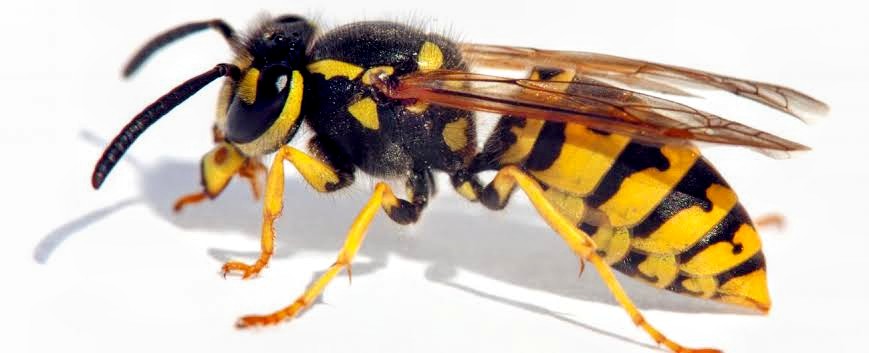
European wasps like this one have been causing trouble in Malua Bay. Photo: Whitehorse City Council.
Relief is in sight for beachgoers and picnickers in Malua Bay, who have been plagued by the inhabitants of a freakishly large European wasp nest.
Eurobodalla Shire Council has finally located the nest and is taking action.
The bloated colony likely has “thousands of thousands of wasps,” and about a dozen entrances, instead of the usual one or two.
Usually colonies have a year lifespan, with new queens leaving to begin nests of their own over winter. This one, however, is a little different, and has steadily grown over about two years to its currents size.
“There are no birds near that nest, the whole area is devoid of life,” Eurobodalla Shire Council invasive species supervisor Paul Martin said.
“They’re voracious hunters and they can travel about a kilometre from their nest. They smash anything that moves and reduce prey availability for other native wasps and birds.”
The climatic conditions that have led to the nest in Malua Bay have also boosted the number of European wasp colonies across the shire.
Although they’ve been in the region for more than a decade, this year they’ve gained a firm foothold.
Not to be mistaken for native Australian wasps, they have black antennae, rather than the yellow antennae of the native wasp, and make their homes in burrows, rather than the paper-like nests built by Australian wasps.
They’re not picky homemakers – cracks in walls or cement in urban areas, holes in the dirt out in the bush, and even boat ramps are all cozy nests for these pests.
Their main priorities, Paul said, were a hole they could expand into a nest, access to sugar in spring – from flowers or empty soft drink cans – and access to protein after Christmas. Pet food, fish carcasses and other bugs all fit the bill.
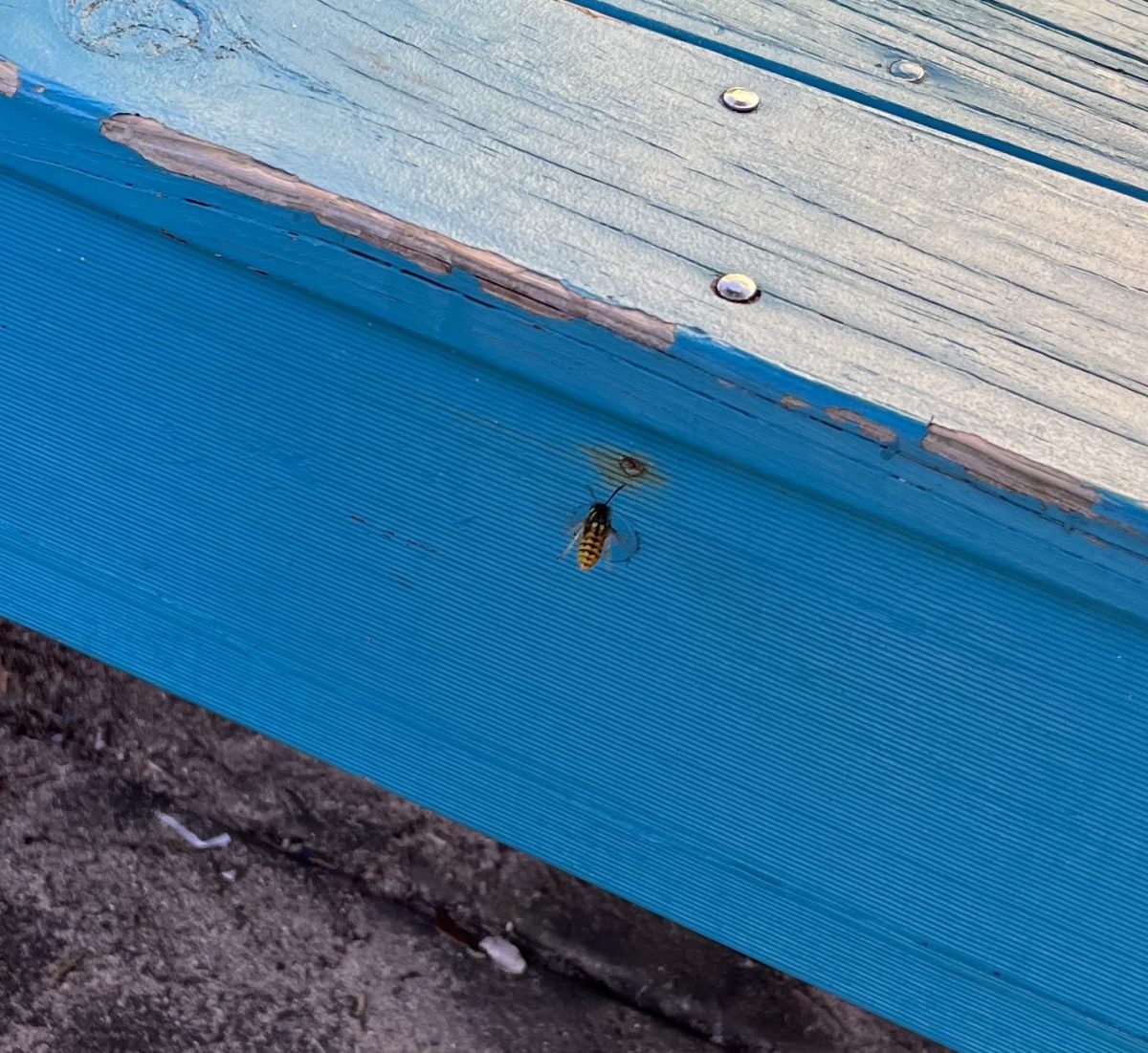
A European wasp on play equipment at Malua Bay. Photo: Kim Treasure.
Trapping individual wasps without finding the nest does nothing to control them, but as their nests are so hidden, and they travel so far to hunt, locating their home is easier said than done.
If you do know where a nest is, the council’s invasive species control team are keen to hear about it.
“If they’re in urban areas and people know where they are we can help get rid of them, especially if it’s a public safety issue,” he said.
“I know wasps have also been bugging people at picnics and barbecues in Batehaven, but we can’t control them if we don’t know where the nest is – you have to kill the queen or you’re fighting a losing battle.
“Often they get into vents, eaves and brickworks in people’s homes and that’s a big issue – if you have that kind of problem you need to seek professional pest control advice, because if you try to do it yourself you could inadvertently push thousands of wasps inside your home.
“If it’s a ground nest and safe to access we can certainly help, and we can take a look at nests in residential dwellings, but those cases really need professional advice.”
Paul and his team have treated three nests in the past week, not including the monster-sized nest in Malua Bay.
It’s near the coastal walking track at Pyang Avenue, and due to the size, complexity and location of the nest requires a specialist approach that may take weeks to complete.
“A professional inspected the Malua Bay nest on Monday, and is going to do a pressurised injection into the hive,” Paul said.
“We’ll close the walking track off when it’s treated, but it is far enough away that people can safely use the track until then.”
To reduce the presence of wasps in the region there’s a few things all of us can do.
Plugging up holes in and around the home will help to prevent not just wasps, but also mice and other pests.
Keeping protein sources, like pet food, inside also helps. Remembering to thoroughly clean fish tables at boat ramps and dispose of fish frames into the water also helps to reduce the amount of food available for hungry wasp colonies.

Swimmers at Malua Bay Beach have been bothered by the wasps, which can cause painful stings. Photo: Kim Treasure.
If you are bothered by European wasps, keep calm and don’t threaten them.
“When a European wasp feels under threat it releases a pheromone which attracts all the other wasps which will try to defend it by stinging anything they can find,” Paul said.
“They do tend to leave you alone if you don’t hassle them, but if you have half a dozen wasps at your picnic table and you swat one the rest are going to start stinging.”
This can be especially dangerous if there are young children or people with allergies about.
“If you get hundreds of stings, that’s not going to be good,” Paul said. “The pain lasts for about five minutes before it starts to dull.
“If they swarm and sting the face and neck the swelling will be enough to restrict your airway, and children especially are so small.
“They’re not out to get you, but from the perspective of biodiversity and human safety they’re not something we want around, so the more nests we can get rid of, the better.”
As thousands of angry wasps can pour out of a treated nest, for safety reasons it’s always best to get professional help if you find one on your property.
Unfortunately the pests are widespread throughout Australia, making them impossible to eradicate.
For assistance with European wasps, contact the Eurobodalla Shire Council on 4474 1000.







